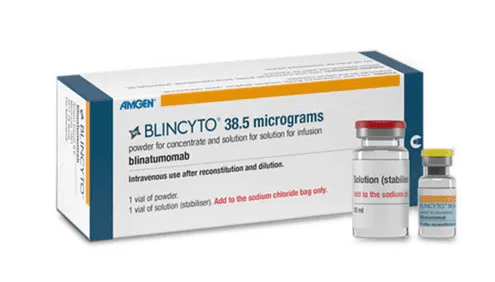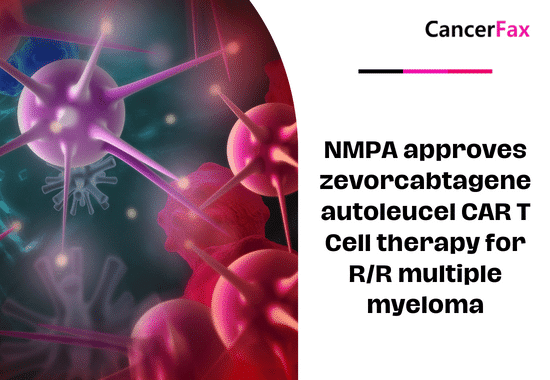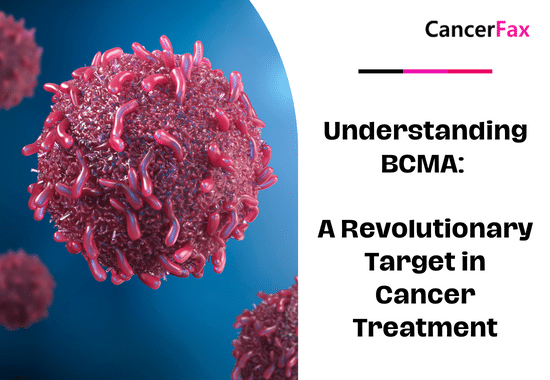Results from a big clinical trial show that adding blinatumomab (Blincyto) to the treatment of people with acute lymfatische leukemie (ALL) who are in remission, even if there are no signs of their disease, can help them live longer.
In the study, giving blinatumomab along with chemotherapy made people with cancer that had gone into remission live much longer than those who only got chemotherapy, which is the current standard treatment. Patients in the trial were not only in remission, but there was no sign of their cancer. This is called having minimum residual disease (MRD)-negative ALL.
De resultaten van de proef werden getoond tijdens de jaarlijkse bijeenkomst van de American Society of Hematology (ASH) in New Orleans in december 2022.
In 2018, the Food and Drug Administration (FDA) cleared blinatumomab to treat people with MRD-positive ALL who were in remission but still showed signs of cancer during follow-up tests. Even though recurrences after remission are always possible, people with MRD-positive ALL have a higher chance of their cancer coming back after their first treatment than those who do not have MRD.
At the ASH meeting, the results were shown for people who did not have MRD after their first medication.
3.5 jaar na het starten van de post-remissietherapie was 83% van de patiënten die werden behandeld met blinatumomab en chemotherapie nog in leven, terwijl slechts 65% van de patiënten die alleen met chemotherapie werden behandeld, nog in leven was.
Blinatumomab ook effectief voor MRD-negatieve ALL
B-cell ALL is the most common type of ALL in both adults and children. It is a type of Leukemie that spreads quickly and is very dangerous. Chemotherapy is the standard treatment, and it often leads to remission. However, a lot of people get sick again, even if tests done after treatment show no signs of disease.
Geneesmiddelen voor immunotherapie hebben enige belofte getoond als een manier om kanker te behandelen nadat het in remissie is gegaan en het risico dat het terugkomt te verkleinen.
Een type van immunotherapie called a bispecific T-cell engager (BiTE) is what blinatumomab is. It sticks to both T cells and cancer cells at the same time. This makes it easy for T cells to find and kill the cancer cell by bringing them closer together. The drug, which is given through an IV, has been shown to be more effective than chemotherapy at treating B-ALL that has come back in children and young adults who have already been treated for it.
Deze proef, die wordt uitgevoerd door de ECOG-ACRIN Cancer Research Group met hulp van de NCI, begon in 2013 om te zien of blinatumomab mensen zou kunnen helpen bij wie net de diagnose B-cel ALL was gesteld.
Hoewel er in totaal 488 mensen deelnamen aan het onderzoek, waren de resultaten die bij ASH werden getoond alleen voor de 224 mensen die in remissie waren en MRD-negatief waren na de gebruikelijke initiële chemotherapieregimes. De patiënten kregen naast blinatumomab ofwel meer chemotherapie of alleen chemotherapie. Vervolgens kregen alle proefpersonen gedurende 2.5 jaar om de zes maanden chemotherapie. Sommige mensen kregen ook beenmergtransplantaties als hun arts dacht dat dit het beste was.
Het toevoegen van blinatumomab aan chemotherapie verbeterde niet alleen de algehele overleving, maar het zorgde er ook voor dat patiënten langer leefden zonder dat hun kanker terugkwam in vergelijking met degenen die alleen chemotherapie kregen.
Dr. Litzow said that none of the people who took blinatumomab had any unexpected side effects. Some of the most common side effects of blinatumomab are fever, responses to the infusion, headaches, infections, tremors, and chills.


